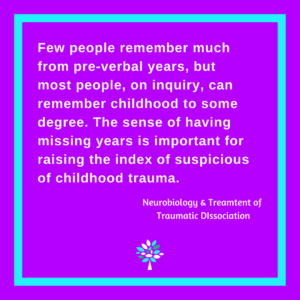Quote from Neurobiology & Treatment of Traumatic Dissociation

It is generally agreed that autobiographical memory starts at about age 4. A common issue with childhood trauma is the lack of autobiographical memories for particular events or time periods, sometime years at a time are missing. So it is understandable that when in therapy people to want to recover those memories, to make sense of the gaps in their story.
But it is important to be wary of any therapy or approach that promises to help you recover those memories or that promises that you will have any kind of certainty that the memories recovered are accurate and true reflections of an external reality. We simply do not have the tools or the knowledge within psychology or neurology to make such promises and claims.
That being said, in my experience EMDR therapy CAN stimulate memory networks and clients SOMETIMES have a clearer sense of things that were missing before.
And in fact, it does not matter if what comes up during EMDR therapy is truly a memory, a story, a dream or some combination thereof. Regardless it can be used to better understand the beliefs that a person has about themselves and it can be used as a way in to help heal your brain.
This is one of the reasons that I think EMDR therapy is so wonderful. We work with what the client brings us and help them make sense of what it means for them and how it fits in their story. What matters is that there is some emotional reality to the fact that it has affected the person.










